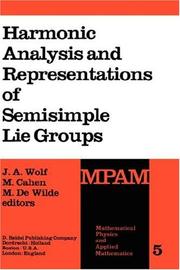| Listing 1 - 6 of 6 |
Sort by
|

ISBN: 9027710422 9400989636 940098961X 9789027710420 Year: 1980 Volume: 5 Publisher: Dordrecht
Abstract | Keywords | Export | Availability | Bookmark
 Loading...
Loading...Choose an application
- Reference Manager
- EndNote
- RefWorks (Direct export to RefWorks)
512 --- Harmonic analysis --- -Representations of groups --- -Semisimple Lie groups --- -Semi-simple Lie groups --- Lie groups --- Group representation (Mathematics) --- Groups, Representation theory of --- Group theory --- Analysis (Mathematics) --- Functions, Potential --- Potential functions --- Banach algebras --- Calculus --- Mathematical analysis --- Mathematics --- Bessel functions --- Fourier series --- Harmonic functions --- Time-series analysis --- Algebra --- Congresses --- Semisimple Lie groups --- Representations of Lie groups --- -Algebra --- 512 Algebra --- -512 Algebra --- Semi-simple Lie groups --- Topological groups. Lie groups --- Harmonic analysis. Fourier analysis --- Analyse harmonique (mathématiques) --- Groupes de Lie semi-simples --- Représentations de groupes --- Representations of groups --- Représentations de groupes. --- Harmonic analysis - Congresses --- Semisimple Lie groups - Congresses --- Representations of Lie groups - Congresses --- Analyse harmonique (mathématiques) --- Représentations de groupes.
Book
ISBN: 9026505663 Year: 1984 Publisher: Lisse
Abstract | Keywords | Export | Availability | Bookmark
 Loading...
Loading...Choose an application
- Reference Manager
- EndNote
- RefWorks (Direct export to RefWorks)
Book
ISBN: 902650683X Year: 1986 Publisher: Lisse Swets & Zeitlinger
Abstract | Keywords | Export | Availability | Bookmark
 Loading...
Loading...Choose an application
- Reference Manager
- EndNote
- RefWorks (Direct export to RefWorks)
School management --- Lerarenopleiding --- algemeen --- algemeen. --- Algemeen. --- Algemeen
Book
ISBN: 9783642116681 Year: 2011 Publisher: Berlin Heidelberg Springer Berlin Heidelberg
Abstract | Keywords | Export | Availability | Bookmark
 Loading...
Loading...Choose an application
- Reference Manager
- EndNote
- RefWorks (Direct export to RefWorks)
This volume is the result of a research project entitled Evolutionary Continuity - Human Specifics - The Possibility of Objective Knowledge that was carried out by representatives of six academic disciplines (evolutionary biology, evolutionary anthropology, brain research, cognitive neuroscience, cognitive psychology and philosophy) over a period of three and a half years. The starting point for the project was the newly emerging riddle of human uniqueness: though the uniqueness of human beings is undisputable, all explanations for this fact have successively been discarded or refuted in recent decades. There is no special factor that could explain the particularities of human existence. Rather, all human skills derive from a continuous relation to pre-human skills, that is to say, to elements that were developed earlier in the phylogeny and were later inherited. But starting from abilities that are anything but special, how could the particularity of human beings have evolved? This was the guiding question of the project. In this work we try to answer it by addressing the following problems: How strong is evolutionary continuity in human beings? How can we understand that it gave way to cultural discontinuity? Which aspect of cultural existence is really unique to humans? Can the possibility of objective knowledge be seen as a (admittedly extreme) case in point? - The answers are meant to help clarify the central issue of contemporary scientific anthropology.
Book

ISBN: 9783112313480 Year: 2020 Publisher: Berlin Boston
Abstract | Keywords | Export | Availability | Bookmark
 Loading...
Loading...Choose an application
- Reference Manager
- EndNote
- RefWorks (Direct export to RefWorks)
Book

ISBN: 9783112314081 Year: 2020 Publisher: Berlin Boston
Abstract | Keywords | Export | Availability | Bookmark
 Loading...
Loading...Choose an application
- Reference Manager
- EndNote
- RefWorks (Direct export to RefWorks)
| Listing 1 - 6 of 6 |
Sort by
|

 Search
Search Feedback
Feedback About UniCat
About UniCat  Help
Help News
News